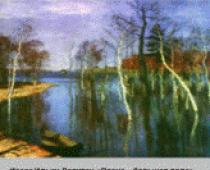It is impossible to imagine a healthy humanity without a clean and prosperous living environment.
The psychology of health and long life is, first of all, instilling in a child in early childhood a sense of respect and love for nature.
Nature is not only forests and lakes, it is ALL living things, the whole Cosmos. This is what surrounds a person, this is the primary environment, without which his full-fledged, unburdened existence, physical and spiritual health are simply unthinkable. The idea of separating man from Nature, declaring him “the crown of creation and transferring into his jurisdiction and undivided use the world of Living Nature and all its riches is a violation of the “Primordial balance”. Man is a part of nature. When he ceases to feel himself as this part, harmony is disturbed, which leads to disaster.
The destruction of nature always entails consequences, one of which is the irreversible spiritual loss of modern man, cut off from his folk roots.
It is very difficult to educate, instill love and respect for Nature, creating a huge environmental problem. The senseless mass destruction of animals, trees, and bodies of water is a threat to earthly prosperity, a harbinger of the death of the living world.
Man needs to come to his senses and understand that without nature, not only healthy offspring, but the very life of humanity is impossible! Changes in Nature will lead man to mutations. Each of us must feel responsible for everything that happens around us, for the land that belongs to everyone - who came before us and who will come after us.
The psychology of health and longevity begins with the feeling of being part of this unique beauty of Nature, with love for insects, dogs and cats... And this love should be based on such concepts as duty, memory, conscience.
How to do it?
Original taken from oleg_bubnov in Love for Nature for children and adults

How much people consider themselves nature lovers and try to spend a significant part of their free time away from the bustle of the city! After a vacation or weekend, having breathed in fresh air, bathed well and gained strength, we return home with new impressions. Love for nature ennobles a person, makes him kinder and purer, if only it is true love.
What is our love? Is it mutual? How do we feel about what we love?
Child's love for nature
The little man, developing, learns about the world. Initially, children have the potential to love all living things. And if a child, growing up, begins to destroy nature and animals, then adults are primarily to blame for this, because fostering a love for nature begins from infancy, and it is very important to instill in time a sense of responsibility for all life on earth.
We teach to love small things
It is important that the child understands: even the smallest creature is worthy of life. Let cultivating a love for nature begin with insects. One-year-old babies are actively exploring the world, and their attention is attracted by bright butterflies, bugs, and ants. The child wants to touch everything and test its strength. He does not yet understand the fragility of the creatures around him, so he needs to be taught to treat even a bug with care.

Explain to your child that when he squeezes a beetle in his hand, he hurts the insect, tell your child more about the world of insects, look at pictures in books. And your efforts will gradually begin to bear fruitful fruit. Rescue ladybugs and bugs with your child. Let the child remove the insect from the road where it could be crushed, or get the bug out of the puddle. Praise the little rescuer. After all, he did a good, good deed.
Cats and dogs are best friends
Very often, pets become children's favorites. They do an excellent job of raising young explorers of the big world. Playing with cats or dogs teaches a child to treat animals with care and to empathize. It is not uncommon to see small children talking to their “little brothers.” After all, for them such communication is more useful and better than any toys. And you can’t replace it with anything.
Don't feel afraid that something is wrong with your child when he tries to pick up a kitten by the tail or pokes a dog in the eye with his finger. This is not because the baby is cruel. It’s just how children learn about the world, they need to touch everything, conduct a little experiment. The child does not yet understand that animals experience pain just like people. And your job is to explain it. Tell them that animals are fragile and can be hurt or harmed. Do not leave your child alone with the animal; always monitor the communication process so that you can always correct the child’s actions. Your time together is another contribution to nurturing a love of nature.

Tell your child more about the habits and habits of animals, so that the child knows the characteristics of small pets and learns to love and understand them. Involve your baby in caring for your cat or dog. Of course, the child will not immediately acquire the habit of caring for or feeding a pet. But gradually your goodwill and warmth will bring results. The child will begin to develop responsibility and love.

Green friends
Along with animals, instill a love for plants. Let your baby help care for indoor flowers. This is also a part of nature, which teaches love and spiritual beauty. Let the baby water “his” flower. Let him plant a sprout or seed and watch how “his” plant gradually grows. After all, cultivating a love for nature lies in the little things that a little later will give you a kind, caring person who loves the world around him.

Adult love for nature
For example, consider a couple of situations that almost each of us has repeatedly observed. Here a group of young people with large backpacks and packages gathered, as they often say now, to “have fun” in nature. They took with them a powerful music system and enough strong drinks to feed a company of soldiers. How they will “rest” and what they will bring to their surroundings is not difficult to guess. Somewhere on the banks of a river or lake they pitched tents and made a fire. “So what's wrong with that?” - you ask. So far it seems like nothing, although... For some reason the fire was not built in a clearing, but right in the middle of the bushes and trees. It’s not even worth talking about the fact that the smoke and heat from the fire will be harmful to plants - and, what good, they will make people laugh.
What about the music? Why not listen to the splashing of water, the rustling of trees, the chirping of birds? Isn't that why we leave the city in the end? No, blaring music filled everything around, and not only the eardrums of young people (who think they are relaxing) are suffering - nature is suffering. Most of us say that nature is alive just for the sake of saying that nature is alive. But this is really so! All nature is inhabited by living, conscious entities, which we, having moved away from it over many millennia, have forgotten how to see and hear. Why, we don’t even know about their existence. For us they are just “literature”, images that come from myths and tales, and that’s at best. For such entities, such a roar is real torment, they suffer, and this affects flowers and trees, animals and birds.
And nature suffers not only from noise. It's no secret that most people smoke. Smoke poisons the human body, and for the “essentials” who live in the forests, where, thanks to the relative distance from civilization, everything is much cleaner than in the city, this disgusting thing is especially painful. Is this love?! And what kind of “gratitude” the faithful servants of the Creator and Lord, who care for nature, send us for our obvious shamelessness, is visible to the naked eye. Dry rivers and lakes, ruined trees, endangered animal species and much more over the past decades have changed even the visible world of the planet almost beyond recognition; there is nothing to say about the subtle world. What kind of “reciprocity” is there! We don't deserve it!
...And two days flew by in such a frenzy, it’s time to go back. All around were broken bushes and mountains of rubbish, withered by smoke. You should take the garbage with you and throw it in a special container, but this never occurs to anyone. For what? After all, they are not going to come back here anymore, there are plenty of other places, Russia is big. Let others take care of themselves. It's sad, if not tragic...

Another example. The men go fishing. But not with fishing rods and spinning rods, but with nets and slings. They catch fish in bags, throw away small change, without thinking about anything - neither about the fact that they are polluting the subtle world with their aspirations and actions, nor about the fact that they are seriously disturbing the ecology of the visible gross material world. What if they engage in such “fishing” during spawning, when the reproduction process is underway? Moreover, for the sake of one caviar (!), gutting and throwing away the most valuable fish, which was never able to fulfill one of its most important natural tasks - to bear offspring! What kind of love for nature is there, it rather smacks of hatred.



And almost none of us think about the fact that we will have to answer to the fullest extent for our actions - we managed, they say, to bypass the earthly law, and okay. There is no need to talk about responsibility before God, in whom many do not believe. But we ignore even our responsibility to our children, in whom each of us “oh, how we believe!”, leaving behind chaos, dirt and destruction. It's an ugly picture, but that's how it really is. True love for nature, without a doubt, would help every person change for the better.


Nowadays, the problems of protecting the natural environment and ensuring environmental safety have become very important. People have seen from their own experience that, unfortunately, no human intervention in nature goes unnoticed; very often the rash actions of people have extremely unpleasant consequences. The widespread opinion in the twentieth century that man is the conqueror of nature turned out to be erroneous.

Man is simply one of Mother Nature’s children, and, as it turned out, he is far from being her most intelligent child, because no other creatures destroy the world in which they live. In order to somehow make up for past mistakes and prevent such mistakes from being made in the future, today humanity pays a lot of attention to such issues as protecting nature, economical consumption of natural resources, caring for animals and plants...
Once upon a time, people thoughtlessly thought that such seemingly insignificant phenomena as the extermination of some type of insect, deforestation somewhere far away in the taiga, or pollution of a small river were unlikely to have any serious consequences. However, as practice has shown, even these “little things” can become fatal, because everything in the world is interconnected, so that even the disappearance of the tiniest link in the chain inevitably leads to a disruption of the general balance. As a result, we have what we have - global warming, ozone holes, hundreds of species of animals and plants that are on the verge of extinction...

The people themselves are also suffering, who today are faced with many problems unknown to them before - an increase in the number of various diseases among the population, the birth of a large number of babies with certain pathologies, and much more. Today, healthcare has become one of the main priorities of human society, since the deterioration of the environmental situation has dealt a serious blow to people's health. Excessive human activity and irresponsible attitude towards nature have turned against us, therefore, if we want to preserve natural resources for our descendants, who will live many hundreds of years after us, we must take active measures to protect the environment now.
What to do?
We need to start small - with the fight for the cleanliness of our locality, because ecology is the key to our common prosperous future. When you go to nature to relax, you should take large garbage bags with you and clean up before and after yourself the area where you are resting or going to rest (and preferably not only after yourself). It is worth setting an example for people, conducting active campaigning everywhere (leaflets, posters, newspapers, explanations), holding mass cleanup days, teaching people to take care of the natural environment, fighting those who stubbornly do not want to change their boorish and consumerist attitude towards Nature (attracting to liability).

Everything returns to normal, everything that we have prepared for ourselves, according to the great Law of Interaction, which is sometimes called the “Law of Sowing and Harvest.” It doesn’t matter that we don’t know about the existence of universal and most perfect Laws of the Universe, our ignorance does not exempt us from responsibility. So isn’t it better for each of us, before it’s too late, to try to look at ourselves from the outside and start doing something?
Let us still love, appreciate and respect Mother Nature, because this is ours, in which we live! Let's not thoughtlessly throw trash anywhere (even travel tickets or ice cream paper)! Think! Do it! Teach yourself and others order and cleanliness! It’s clean not where they clean, but where they don’t litter...

Nature is like a simple miracle,
It is impossible to understand and unravel. Then he puts on a fur coat in the cold,
It melts the asphalt to dust.
Rain in the heat is uncontrollably desired,
Fast streams tremble.
Soul impulses pacify
And cleanses thoughts from filth.
People are in a hurry to learn all the facets
Dear mother nature.
But they understand that something controls us -
Ignorance does not let you through and stands like a wall.
Dreams go on forever.
The tracks are tangled in the shadows.
Nature reveals eternity,
For those who are pure in their thoughts.
, http://puzkarapuz.ru/content/289.
Now, lately, I am increasingly concerned about the question of whether we are treating correctly what nature gives us, because everything is very deplorable in the countries of Europe and the 3rd world, despite all the chic and splendor of everyday life. Few people are now really attracted to the idea of preserving nature and. Everyone is trying to fill their pockets with more money, and it doesn’t matter how they get it.
Let's look at some countries where natural resources are on the verge of extinction.
Kenya: Lake Naivasha. Not far from it there are flower greenhouses. They occupy a huge territory, the flowers are sprayed with pesticides every day, which greatly pollutes the lake, but people have jobs, poorly paid, of course, but still there! From here flowers are transported throughout Europe over a distance of about 6,000 km. Nairobi has the largest slum in the world, where people survive in deplorable conditions.
People's Republic of China: every week 2 thermal power plants are launched, which consume coal as fuel. It is because of this that China firmly ranks first in the world in the amount of gas released into the atmosphere, which destroys the ozone layer.
The population in China is the largest in the world. And therefore, it is not surprising that the city with the largest number of people living in it is also located in China, this is Chongqing. Population - 34 million inhabitants.
IN South Korea It is home to one of the largest shipyards in the world. The state's economy is developing rapidly. Wealth comes at the price of environmental pollution. Seoul, a city in South Korea, is the most polluted in the world.
Nepal: It has been proven that the air around the peaks of the Himalayan range is as dirty as in our cities. Why? The fact is that atmospheric air flows are delayed by mountains. Scientists believe that by 2035, most of the Himalayan glaciers may disappear, but they are the main source of water for large rivers in Asia.
India: in the 60s, agriculture developed intensively in the country, which led to the depletion of groundwater. When the wells begin to dry up, women dig reservoirs with improvised means to collect rainwater! Mumbai has become one of the largest cities in the world with a thriving stock exchange. more and more money and people, and less and less water...
Indonesia: Native tree species are being replaced by palm crops, they provide oil, which is already included in many products around the world. This is far from a useful product. In many rivers in Indonesia, the water has turned red-brown, because there are almost no trees in the mountains and the earth is crumbling.
Thailand: Thanga Bay, near Phuket. Mangrove trees, which provide a lot of fish and shrimp, are disappearing. But the emerging shrimp industry - the shrimp business - has had a huge impact on the disappearance of mangroves. The thing is that for shrimp to grow, the reservoirs in which they are bred must be constantly saturated with antibiotics, which have a fatal effect on trees. But on all the beaches where tourists relax, there are shrimp!
USA: a powerful military power, the largest consumer on the planet. In America, everything is tied to oil. Basically, all cattle farms exist only thanks to oil. Modern methods of animal husbandry are terrible because the by-product is a large amount of poisonous gases - more than from all vehicles combined. 60% of the entire grain harvest goes to feed animals, so those who value natural resources convince us.
Nigeria: oil again. Here it is mined from underground. Nigeria ranks first in oil production in Africa, however, it is one of the poorest countries on the planet. All the country's wealth is taken away, and local residents die of poverty; there is a constant guerrilla war going on here.
A couple of centuries ago, man was still a part of nature and lived in harmony with it, because the main population lived in. And village residents have always perceived themselves as part of the world around them. Hunters killed animals when they needed to get meat for food and skins for clothing. Animals have never been exterminated for fun. The land was treated with respect and care, because it is the main breadwinner. There were no factories in the villages, no forests were cut down, no toxic waste was dumped into the rivers. But environmental problems on the planet did not begin suddenly and not yesterday. Remember the whales, which were almost all exterminated because Europeans needed materials to make corsets. And no self-respecting woman left home without them. And the vast majority of men had a noble posture not because of strong, trained muscles, but thanks to the same corsets. And what did gentle and brave young ladies in rainy London or hot Madrid care about some distant and unknown whales? Over the past centuries, the population has increased sharply. Cities with a population of one million grew. The volume of industrial production has increased hundreds, or even thousands of times. Forests are being destroyed, animals are being destroyed, the water in rivers and lakes is polluted; in order to breathe clean air, city residents have to travel far outside the city. This is retribution for the benefits of civilization. Who wants to grow bread today, bake in winter, walk tens of kilometers and sew clothes themselves? There are eccentrics who build eco-villages and try to maintain an almost primitive communal system. But how many are there compared to the rest of the Earth's population? People want to live in comfort, and therefore they turn a blind eye to many things. Life is already full of stress to think seriously about ozone holes. Who really cares about the extinction of some animals in the Ussuri taiga or the death of the Aral Sea? Here you need to pay off your mortgage faster and change the tires on your car. What kind of tigers or whales are there? Not up to them. And an official sitting in a huge office on the top floor of a building made of stone and concrete, and giving orders to cut down several hectares of forest, does not consider himself a criminal and a destroyer of nature. He has not seen this forest and will never see it. What difference does it make to him that several species of animals will die there, because their natural habitat will be destroyed. But a personal bank account is close and understandable. And such people are not monsters with hooves and tails. No, these are often loving fathers of the family and witty interlocutors. Most likely, they have a favorite dog with whom they like to run in the morning or an affectionate cat. And in general they love animals. But they love themselves and their comfort more. No matter how detached a person is from nature, he still remains a part of it. By destroying nature, humanity is slowly and systematically destroying itself. People suffer from diseases that few people knew about 50 years ago. Allergies, stress and phobias have become a real scourge of modern society. What will happen next? Nobody can predict. One thing is clear - we need to change our attitude towards the world around us. If it's not too late.
- In contact with 0
- Google+ 0
- OK 0
- Facebook 0








